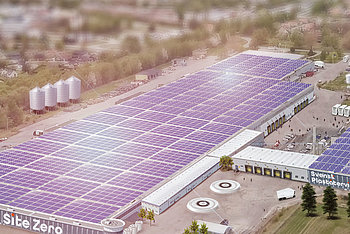Sweden. Another contract in Motala – “Site Zero” for Sutco RecyclingTechnik
Motala. With the ability to handle 200,000 tonnes of plastic packaging per year, the “Site Zero” recycling facility in Motala, Sweden, will be the largest and most modern plastic recycling facility in the world.
The Swedish company "Swedish Plastic Recycling" (Svensk Plaståtervinning) is continuing to invest in the treatment of plastics and has awarded Sutco RecyclingTechnik GmbH the contract to construct its second facility, "Site Zero" in Motala. Sutco RecyclingTechnik drew up the concept for “Site Zero” over a period of around ten months, together with the Norwegian engineering office Mepex Consult and the client, Swedish Plastic Recycling. It was four years ago, in 2017, that Sutco RecyclingTechnik GmbH designed and built Motala I – at the time, the most efficient and modern plastic treatment facility in Europe. Now “Site Zero” (Motala II) is to follow, using next-generation technology, making it in all likelihood the most cutting-edge plastic treatment facility in the world.
The plant, to be completed in 2023, will be able to sort twelve different types of plastic packaging and then recycle them in a carbon-neutral, emissions-free way. The sorting capacity at the 60,000 square metre site runs from PP, HDPE, LDPE, PET trays, coloured and clear PET bottles, PP foil, EPS, PS, PVC, two kinds of polyolefin mixtures all the way to metal and non-plastic waste.
‘With “Site Zero” we are doubling our current annual capacity to 200,000 tonnes. This means that, in future, we will be able to accept all the plastic waste produced by Swedish households and make sure it is reused within the circular economy,’ explains Mattias Philipsson, CEO of Swedish Plastic Recycling (Svensk Plaståtervinning).
The small pieces of plastic produced during sorting are separated and sent for chemical recycling or processed into new composite materials. To this end, a newly developed process design has been incorporated into sorting, allowing the flexible production of preliminary products for chemical recycling. This means the plant operator will be able to react to future changing market demands.
‘From 2025, in Phase 2, we will also wash and granulate our plastic waste. From that point we will be able to cycle all the packaging waste produced in Sweden within a closed system,’ Philipsson continues.
“Site Zero” will be fully carbon-neutral and generate no emissions. The plant will run on renewable energy and the small quantity of plastics and other waste that cannot be recycled will be sent for emissions-free energy recovery – so-called CCS (Carbon Capture Storage). The plans also intend to cover the expansive flat roof of the building with solar panels to help generate energy. From 2023, Motala I and Motala II will be fitted with Near Infrared (NIR) sensors and approx. 5 kilometres of conveyor belt, by which every single piece of packaging waste produced in Sweden can be processed.
The Swedish environmental authority is also involved in the construction of the plant, contributing over 180 million krona from its climate investment programme. The extensive engagement and financial support provided by the Swedish economy and governmental agencies provide the perfect foundations for Sweden’s future world leadership in plastics recycling.

